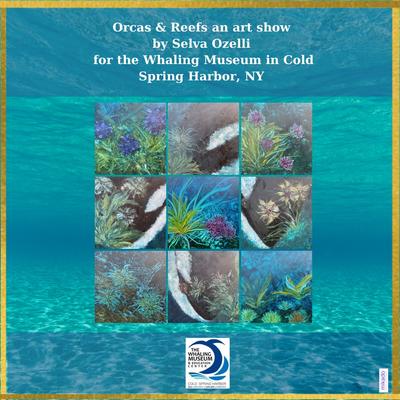Celebrating Climate Week New York with Orcas & Reefs Art Show
BY SELVA OZELLI
Biodiversity is essential to the existence and proper functioning of all ecosystems and is the pillar upon which we build civilizations. Without nature-- including oceans --we have nothing.
The loss of nature and biodiversity is the fourth most severe threat we face in the next 10 years. It comes with a steep cost to the oceans since nearly 10% of global marine species were found to be at risk of extinction, according to the latest report from the International Union for Conservation of Nature (IUCN).
A parasitic killer that reduces black sea urchins – considered essential for the healthy functioning of coral reefs -- has rapidly spread from the Mediterranean through the Suez Canal – wiping out urchin populations in the Gulf of Aqaba and threatening a knock-on effect on Red Sea coral reefs at an unprecedented rate.
These seas are home to many threatened and endangered species – including reefs and orca whales -- which have established breeding grounds across it. Scientists at Tel Aviv University in Israel investigated this alarming marine epidemic that has impacted reefs in Greece, Turkey, Israel, Jordan, Egypt, Saudi Arabia, and UAE, where the United Nations Climate Change Conference (COP28) will take place later on during this year.
Over the next century, climate change is projected to profoundly impact coastal and marine ecosystems, including whales and reefs. Whales are at the top of the food chain and have an important role in the marine environment's overall health.
The orca whale (Orcinus orca) is a toothed whale belonging to the oceanic dolphin family, of which it is the largest member. They are recognizable by their black-and-white patterned body and can be found in all of the world's oceans in a variety of marine environments, from Arctic and Antarctic regions to tropical seas, including the waters of the Great Barrier Reef which is one of the richest and most complex natural ecosystems on earth, and one of the most significant for biodiversity conservation.
Whales play a vital role in the marine ecosystem, where they help provide at least half of the oxygen we breathe, combat climate change, and sustain fish stocks.
Each great whale sequesters an estimated 33 tons of CO2 on average, thus playing its part in the fight against climate change. Increased ocean temperature may cause reef-building coral to bleach, become stressed and eventually die.
Ocean acidification may slow or halt the calcification of several calciferous species, including coral, coralline algae, and mollusks and dissolve calcium carbonate structures on the reefs, which are essential to approximately 25 percent of all marine life.
But the good news is that nations recently agreed on the historic High Seas Treaty to place 30% of the world's oceans into protected areas by 2030 per the UN biodiversity conference COP15 last year. Nations also agreed to develop a legally binding agreement on reducing plastic pollution by 2024.
Multiple award-winning artist Selva Ozelli whose work is cataloged by the United Nations, Tokyo Metropolitan Museum as well as the Berlin University of Art's "Climate Summit Art Project 1972-2022," will launch her Orcas and Reefs Art Show at the Whaling Museum in Cold Spring Harbor, NY during June.
Her art show, which draws attention to the fact that healing has begun to build back biodiversity and reduce plastic pollution in our Oceans.
